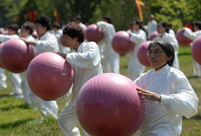 Amphibious armored vehicle unit conducts open sea drill
Amphibious armored vehicle unit conducts open sea drill
 Water relay in Henan
Water relay in Henan
 Ethnic culture feasts eyes of travelers
Ethnic culture feasts eyes of travelers
 80 security dogs assembled in Nanjing police dog training base
80 security dogs assembled in Nanjing police dog training base
 Graffiti artists paint on street walls in Xinjiang
Graffiti artists paint on street walls in Xinjiang
 Story of ceramic artist Zhang Lingyun
Story of ceramic artist Zhang Lingyun
 Magic summer night dream in Hongyuan
Magic summer night dream in Hongyuan
 Incredible creatures in headwaters drainage region of Lancang River
Incredible creatures in headwaters drainage region of Lancang River
 The future of rock n' roll seen in young rockers in China
The future of rock n' roll seen in young rockers in China
 Magnificent Yanziya Cliff
Magnificent Yanziya Cliff
WASHINGTON, Aug. 13 -- Chinese researchers said Wednesday they have found a potential new approach to treating male infertility associated with poor sperm motility and genital tract infection.
Researchers from the Chinese University of Hong Kong and Shenzhen Second People's Hospital reported in the U.S. journal Science Translational Medicine that boosting levels of a protein called human beta-defensin 1 (DEFB1) in sperm might help improve male fertility.
"DEFB1 is found in many parts of the body, but its role in regulating male fertility has not been investigated," senior author Chen Xiaozhang, professor of the University, told Xinhua.
"Our previous studies have found a type of defensin from rat can affect sperm motility, so we want to explore how human defensins work."
Infertility affects 10 percent to 15 percent of couples worldwide, and male infertility contributes about 50 percent of these infertile cases.
Reduced sperm motility, also known as asthenozoospermia, is a common cause of infertility and accounts for about 18 percent of the male infertility cases.
Leukocytospermia, which is related to seminal tract infection, is another common cause of infertility. The problem is observed in about 11 percent of infertile male patients.
In the study, Chen and his colleagues studied 190 normal individuals and 325 infertile men with either asthenozoospermia or leukocytospermia.
The researchers found that DEFB1 can create a shield against viruses, bacteria and fungi around human sperms as they travel through the reproductive tract.
In addition, the protein can also help promote sperm motility.
However, the amount of DEFB1 in sperm from infertile men with either leukocytospermia or asthenozoospermia is much lower compared to that in normal fertile sperm.
Further in-vitro fertilization study showed that sperm treated with recombinant DEFB1, a chunk of the normal DEFB1 protein, has improved motility, working antimicrobial protection and increased egg-penetrating capacity.
"Our study suggests a feasible therapeutic approach for male infertility," Chen said. "But further investigation is still needed to determine its safety in humans."
 Beijing policewomen posters become a hit
Beijing policewomen posters become a hit Armored regiment trains on the sea
Armored regiment trains on the sea Children spend 'Father's Day' with dads at work
Children spend 'Father's Day' with dads at work 'Pan Da' appear in Shanghai World Financial Center
'Pan Da' appear in Shanghai World Financial Center Champions take selfies on podium
Champions take selfies on podium National Fitness Day celebrated around China
National Fitness Day celebrated around China Traditional culture colors summer vacation
Traditional culture colors summer vacation Young athletes fighting for their dreams
Young athletes fighting for their dreams 68 meters high thermometer in Shanxi, called ‘fighter’ of thermometers
68 meters high thermometer in Shanxi, called ‘fighter’ of thermometers The vanishing folk skills
The vanishing folk skills Intoxicating beauty of Dali, Yunnan province
Intoxicating beauty of Dali, Yunnan province Memorable moments of Ludian earthquake
Memorable moments of Ludian earthquake Bring world together to help elephant
Bring world together to help elephant 'Building Dreams'
'Building Dreams'  Labrang Monastery
Labrang MonasteryDay|Week|Month